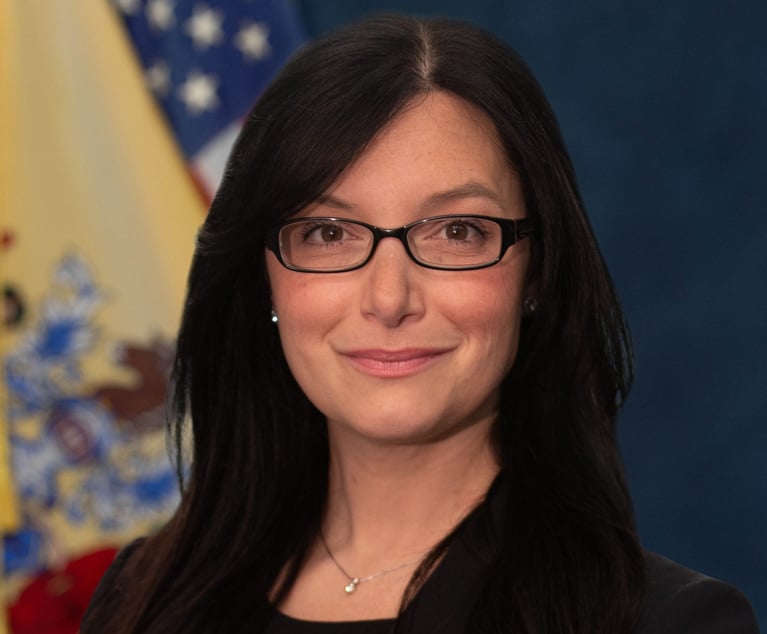 Fewerton/Shutterstock.com
Fewerton/Shutterstock.comA Question of Life or Death
OP-ED: In light of all that is going on around us, public safety demands that Municipal Courts be closed until we can be certain that the coronavirus pandemic is under control. Sadly, this probably will not happen.
March 18, 2020 at 01:00 PM
5 minute read
I have labored in the vineyards of New Jersey municipal courts for the better part of my legal career. I have been in courtrooms large and small, worked with prosecutors, judges and court administrators of all descriptions, and seen parts of the great state of New Jersey I never imagined. Looking back on the lifetime I have spent representing defendants in the municipal court system, I have had rewarding experiences, disappointing experiences, and experiences somewhere between these two extremes.
Being fortunate enough to have the opportunity and privilege to express my opinions through this column, I have expressed my views on how municipal courts should be reformed into a modern court system that lives up to the goals appearing on its seal, "independence, integrity, fairness, quality services." More times than not, I have pointed out what I saw as the system's failures in regard to achieving these goals.
Proposals for reform have been made in the last few years which may hopefully improve the municipal court system. To me, though, these proposed changes amount to just nibbling around the edges of the problem. In my mind, nothing less than systemic reform and modernization of the system is essential. Until that time, the New Jersey Municipal Court system will continue to be the "poor stepchild" of the New Jersey judicial system. This has never been more obvious than now in light of how the system has responded to the current emergent coronavirus crisis.
It goes without saying (and notwithstanding personal political perspective) that the coronavirus pandemic has created a very real and acute public health danger that has in turn affected almost every aspect of our lives. A quick look at the headlines in today's newspapers tells the story. Top of the fold, the headline is that "All 75 Bergen County public school districts closing, moving to online learning as coronavirus grows." Just below that headline, appears "N.J. announces 6 new cases, bringing total to 29 positive tests with 1 death." Further down the page, other headlines announce that that the governor has recommended cancellation of public events, that high school students have been quarantined after possible exposure, that bars and restaurants in certain towns are being closed early to avoid drawing crowds. Public gatherings including the annual St. Patrick's Day parade, Broadway shows, concerts and college classes all have been suspended.
The sports page is even worse. We no longer have to wonder how the resurgent Rutgers men's basketball teams will do in the Big Ten Tournament, or whether it will go to "the Dance," as both events have been cancelled. We will never know how well Seton Hall would be playing against the best teams in the country. Major League Baseball, professional basketball, golf, tennis and hockey seasons are on hold. The back page of a New York tabloid says it all, announcing, "The Day the Sports World Stopped."
From all that we've been told, the best way to avoid the contagion is to avoid contact with others who have been infected by the virus or who are carriers. The new term to describe this is "social distancing." Basically, the idea seems to be, avoid close contact with others as much as possible and wash your hands regularly.
This message appears to have gotten to the courts. News sources report that Chief Justice Rabner has suspended all new jury trials "until further notice" and has directed steps which would avoid bringing together large numbers of people in confined areas. He has further recommended use of video and telephonic equipment to conference cases and other steps to keep the court system running, "in the face of this health crisis." This brings us to the New Jersey Municipal Court system.
We are constantly reminded how the Municipal Court system deals with large numbers of people. According to the court, about 6 million cases work their way through these courts each year. These matters are resolved after appearances in cramped court rooms that in many cases, are not designed for that purpose. With the large number of summons issued, many people appear, especially at the beginning of court. Frequently, prosecutors meet attorneys and defendants in small rooms with other people in close proximity standing in narrow hallways, waiting to speak with the prosecutor. Others will be next to each other on line to pay fines at the Violation Clerk's window.
Needless to say, the ordinary daily functioning of the 500-some-odd municipal courts makes "social distancing" impossible, creating too many opportunities for contact with others and objects. In short, the usual environment of many municipal courts creates a playground for virus transmission at a time we need to limit our exposure.
It isn't unusual for municipal courts in our state to remain open in hurricanes, blizzards and other states of emergency, when other public gathering places have been closed, and unsafe travel has been discouraged because of dangerous conditions. However, in light of all that is going on around us, public safety demands that Municipal Courts be closed until we can be certain that the coronavirus pandemic is under control. Sadly, this probably will not happen. Until it does, my health, the health of my family, my newly born grandchild, that of my colleagues, judges, prosecutors, court personnel and defendants, will be unnecessarily and recklessly compromised. This is not a question of long term reform. It may, though, be a question of life or death.
Peter H. Lederman is a partner with Lomurro, Munson, Comer, Brown & Schottland in Freehold. His practice is limited to representing defendants charged with DWI and related offenses.
|This content has been archived. It is available through our partners, LexisNexis® and Bloomberg Law.
To view this content, please continue to their sites.
Not a Lexis Subscriber?
Subscribe Now
Not a Bloomberg Law Subscriber?
Subscribe Now
NOT FOR REPRINT
© 2024 ALM Global, LLC, All Rights Reserved. Request academic re-use from www.copyright.com. All other uses, submit a request to [email protected]. For more information visit Asset & Logo Licensing.
You Might Like
View All
For Lawyers, the 'Work' of Making an Impact Does Not Have to Happen in a Courtroom. Laura E. Sedlak Says

Doing the Right Thing in the Pursuit of Justice Requires Guts, Says Lyndsay Ruotolo

One Can be Most Impactful When Their Pursuits Are Driven by Their Concerns and Passions, Says Sherilyn Pastor

As a Lawyer, You Have a Powerful Way to Make an Impact, Says Mary Frances Palisano
Trending Stories
- 1Tuesday Newspaper
- 2Judicial Ethics Opinion 24-85
- 3Decision of the Day: Administrative Court Finds Prevailing Wage Law Applies to Workers Who Cleaned NYC Subways During Pandemic
- 4Trailblazing Broward Judge Retires; Legacy Includes Bush v. Gore
- 5Federal Judge Named in Lawsuit Over Underage Drinking Party at His California Home
Who Got The Work
Michael G. Bongiorno, Andrew Scott Dulberg and Elizabeth E. Driscoll from Wilmer Cutler Pickering Hale and Dorr have stepped in to represent Symbotic Inc., an A.I.-enabled technology platform that focuses on increasing supply chain efficiency, and other defendants in a pending shareholder derivative lawsuit. The case, filed Oct. 2 in Massachusetts District Court by the Brown Law Firm on behalf of Stephen Austen, accuses certain officers and directors of misleading investors in regard to Symbotic's potential for margin growth by failing to disclose that the company was not equipped to timely deploy its systems or manage expenses through project delays. The case, assigned to U.S. District Judge Nathaniel M. Gorton, is 1:24-cv-12522, Austen v. Cohen et al.
Who Got The Work
Edmund Polubinski and Marie Killmond of Davis Polk & Wardwell have entered appearances for data platform software development company MongoDB and other defendants in a pending shareholder derivative lawsuit. The action, filed Oct. 7 in New York Southern District Court by the Brown Law Firm, accuses the company's directors and/or officers of falsely expressing confidence in the company’s restructuring of its sales incentive plan and downplaying the severity of decreases in its upfront commitments. The case is 1:24-cv-07594, Roy v. Ittycheria et al.
Who Got The Work
Amy O. Bruchs and Kurt F. Ellison of Michael Best & Friedrich have entered appearances for Epic Systems Corp. in a pending employment discrimination lawsuit. The suit was filed Sept. 7 in Wisconsin Western District Court by Levine Eisberner LLC and Siri & Glimstad on behalf of a project manager who claims that he was wrongfully terminated after applying for a religious exemption to the defendant's COVID-19 vaccine mandate. The case, assigned to U.S. Magistrate Judge Anita Marie Boor, is 3:24-cv-00630, Secker, Nathan v. Epic Systems Corporation.
Who Got The Work
David X. Sullivan, Thomas J. Finn and Gregory A. Hall from McCarter & English have entered appearances for Sunrun Installation Services in a pending civil rights lawsuit. The complaint was filed Sept. 4 in Connecticut District Court by attorney Robert M. Berke on behalf of former employee George Edward Steins, who was arrested and charged with employing an unregistered home improvement salesperson. The complaint alleges that had Sunrun informed the Connecticut Department of Consumer Protection that the plaintiff's employment had ended in 2017 and that he no longer held Sunrun's home improvement contractor license, he would not have been hit with charges, which were dismissed in May 2024. The case, assigned to U.S. District Judge Jeffrey A. Meyer, is 3:24-cv-01423, Steins v. Sunrun, Inc. et al.
Who Got The Work
Greenberg Traurig shareholder Joshua L. Raskin has entered an appearance for boohoo.com UK Ltd. in a pending patent infringement lawsuit. The suit, filed Sept. 3 in Texas Eastern District Court by Rozier Hardt McDonough on behalf of Alto Dynamics, asserts five patents related to an online shopping platform. The case, assigned to U.S. District Judge Rodney Gilstrap, is 2:24-cv-00719, Alto Dynamics, LLC v. boohoo.com UK Limited.
Featured Firms
Law Offices of Gary Martin Hays & Associates, P.C.
(470) 294-1674
Law Offices of Mark E. Salomone
(857) 444-6468
Smith & Hassler
(713) 739-1250






